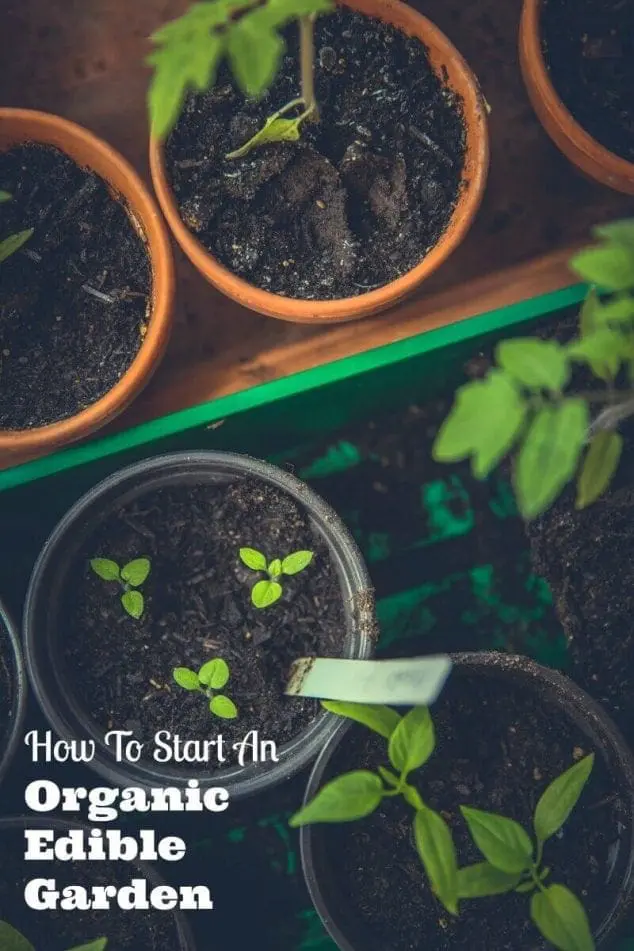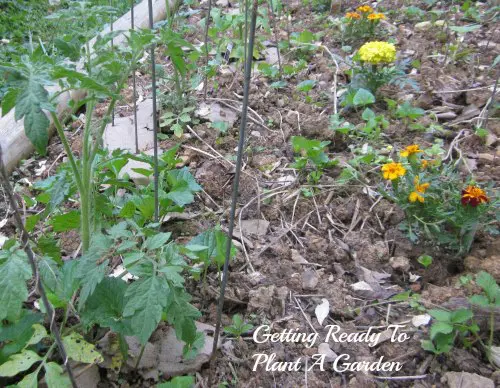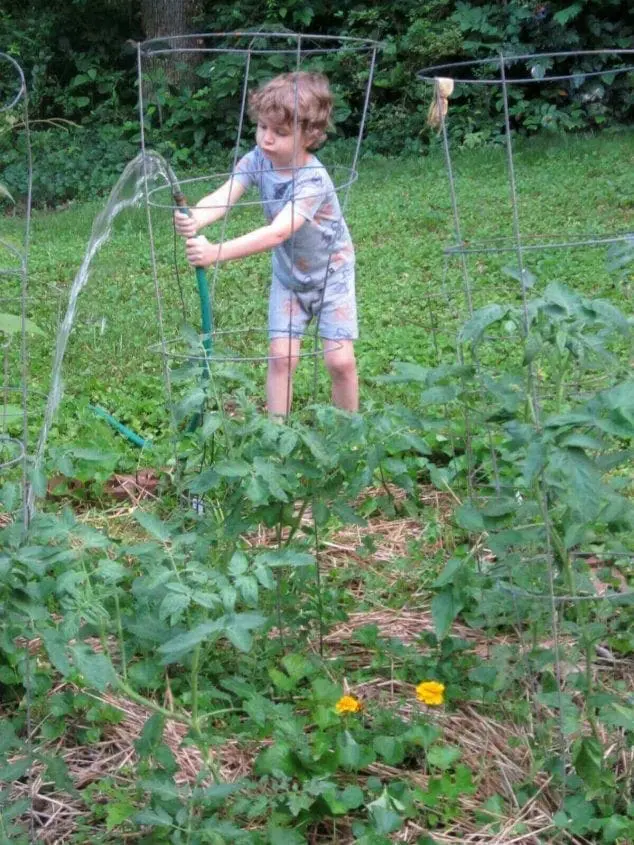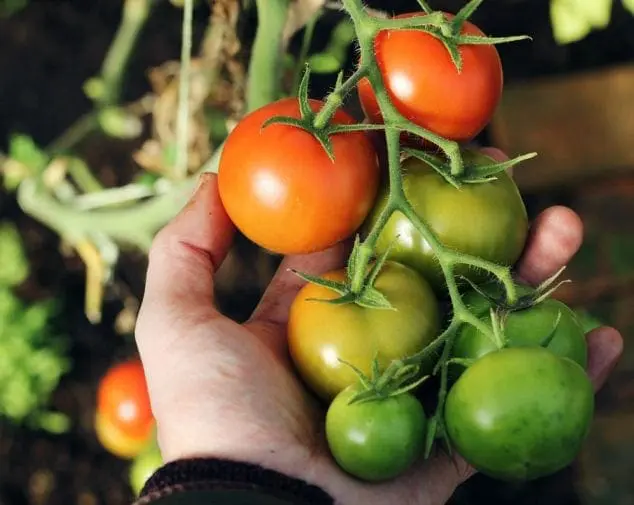Planting an organic edible garden is not only great for growing your own produce, it is also lots of fun. In fact, gardening is fun for the whole family. I have many fond memories growing up in the soil. I loved working the soil with my mom, pulling weeds with my grandmother, and hiding in the garden for hide and go seek with my siblings. Every family should grow an organic edible garden- complete with veggies, herbs, flowers, and fruit. Just a few each will allow you to enrich your meals so much and you’ll be glad you did!
Starting An Organic Garden

Don’t worry if you only have a small space. A small edible garden and/ or container garden is better than no garden- much better!
Organic Gardening Benefits:
Studies show that organic food may actually have more minerals and vitamins compared to food that is grown with chemical fertilizers, herbicides and pesticides. In fact, organic vegetables and fruits aren’t just better for your health, they can also help you avoid the chemical agents that can usually be found in commercial farming nowadays.
When To Plant An Edible Garden
When to plant depends oh what you want to plant, where you are located, and where you are planting. If you will be growing an indoor container garden, you can plant anytime! If you will be starting your seeds indoors, you can time that to be a few weeks to a month before your outdoor garden planting date.
When planting an outdoor organic edible garden, different foods have different growing seasons. So do different temperate areas. You can can consult the Farmer’s Almanac for specifics. As a general rule of thumb you can begin planting most food crops in your outdoor garden after the last average frost date. Here in Nashville, that is April 15th. Mother Earth has a Vegetable Garden Planner that will send customized planting reminders for which crops need planting based on your location.

How To Prepare Organic Garden Soil
You can prepare for your organic edible garden by starting seeds indoors and by preparing the earth. When I was a kid, my favorite part was preparing the earth. My mother would dig in the soil turning it over in big clods. I would then go through and break them up with my fingers to arerate the soil.
We would then mix in various goodies to enrich the earth and help balance the pH, and increase drainage. The two standards for our gardens were organic garden soil and compost. We would sprinkle them evenly over the freshly dug up ground and then I would mix by hand while my mom turned over the soil with the shovel at the other end of the garden. We still carry on this tradition today. I love watching my own kids find worms and pull out rocks and do just what I did as a child.
I chose organic garden soil because of the environmental benefits. In addition, I plan on eating my produce! I believe that old adage- “You are what you eat.” I love growing my own organic herbs and vegetables for making healthy, delicious meals with natural, homegrown ingredients.
Additionally, organic soil is an important choice because healthy soil helps set you up for success. As Kellogg Garden says, “Organic soils can help your plants resist pests and disease, avoiding the need to use chemicals and pesticides. Because organic soil is composed of nutrient and mineral rich elements, your plants will grow stronger cell wells, giving them added layers of protection from pests and disease”.
I love playing in the garden with my kids. Whether we are digging in the dirt, finding worms, weeding, watering, picking off caterpillars, or picking ripe vegetables, we always have a good time. I like knowing it is organic soil that we working with.

10 Easy Organic Edible Garden Plants To Grow
I suggest first time gardeners start with a small garden and expand it each year. You might want to pick just 5 of these 10 organic edible plants for the first year decide to garden.
I have selected these 10 edible garden plants for first time gardeners. These edible garden plants are resilient, produce a good yield, and are use frequently in most kitchens.
1. Tomatoes
Tomatoes are super easy to grow. You can get a started plant at a nursery, hardware, home improvement store, or even some grocery stores. Just don’t chose a start that already has flowers on it because it will likely be root bound. They grow well in pots or in the ground. The main thing to consider with tomatoes is that they grow quickly to quite a large size (depending on the variety). They do need to be staked or grown with a tomato cage around each plant.
2. Peppers
There are many varieties of peppers from sweet to spicy and they are all a great addition to a garden. I suggest pepper starts (baby plants rather than seeds) for first time gardeners.
3. Beans
French beans grow so easily that you can even start them from seeds. It is fun to experience the thrill of watching something come up out of the ground where there was nothing.
4. Cucumbers
I grow my cucumbers in a tomato cage so that they the vine crawls upward. Fun to eat fresh and easy to make into pickles.
5. Potatoes
You can actually plant your own sprouted potatoes and watch them the plants come up. A fun crop for kids to get involved in digging up.
6. Zucchinis
One plant will produce a generous crop of zucchinis. Best from starters for first time gardeners.
7. Strawberries
Probably the easiest fruit to grow and they have new strawberries ripening daily. The only trick with these is beating the birds to the harvest!
8. Rosemary
You will only have to plant rosemary once. It just keeps growing though out the year and is a pretty plant that can be used in many dishes.
9. Thyme
Thyme does well even in drier soil and spreads out covering the ground pretty quickly. It is a perennial herb and can be harvested year round.
10. Basil
Basil is so easy to grow that it can be started from leftovers! It will sprout if you stick the extra basil spring in water for a few days. You can also plant it from starts. It grows quickly. It is an annual and will not survive the cold weather but you can harvest and dehydrate any basil you don’t think you will use fresh.
From this list of 10 easy plants to grow, I suggest first time gardeners pick the 5 that they will use the most and give an organic edible garden a try. As a bonus, you may also like to try growing a few popular edible flowers like Nasturtium which are peppery and great in salads. Or lavender which are lovely in baked goods.
Heirloom Seeds or Seedlings
As gardening time approaches it is good to start choosing seeds and growing some seedlings indoors. When choosing seeds for your garden, consider heirloom seeds.
What are heirloom seeds?
Well, before we can discuss the benefits of heirloom seeds, it seems like a good idea to establish the question, “What is a heirloom seed”? As the word heirloom implies, it means seeds that have been passed down from generation to generation. In other words, before things were mass produced and marketed, people used to save their own seeds from each crop and use those for the following season. Seedsavers.org, a non-profit that makes heirloom seeds available for the public to purchase, defines it as “varieties that have a history of being grown and shared within a family or community”. My library also offers a seed exchange area. You might want to start collecting heirloom seeds yourself!
Why plant heirloom seeds?
If you are like me, you may have heard the term heirloom seeds and thought that it was interesting but I didn’t give it too much thought until I did a little reading on it. In fact, heirloom varieties are so exciting not just because they may produce a different or fun variety that you have not seen before, but because they are imperative to preserving genetic diversity.
The biologist in me got super excited when I heard this. It was one of those “aha moments” when something makes total sense and you wonder why you hadn’t thought of it before. Of course, there are many varieties of seeds and that is part of the fun of gardening. Growing heirloom seeds and saving seeds is easy and important. Keeping diversity alive is what the spice of life is all about, in my opinion. What do you think? Will you try planting some heirloom varieties in your garden this year?
Organic Gardening Tips
One of the secrets to successful organic edible gardening is the use of healthy garden soil since it tends to grow healthier food by the year by replenishing itself naturally. This is also why you should look into using organic fertilizers like composted waste and manure, so that they can go back into earth and create soil that is filled with nutrients and can grow various healthy plants. Practicing sustainable gardening tactics can actually help your garden become self-sustaining overall. As your plants use up nutrients, they get replaced through your natural compost and fertilizers. So, if done the right way, your organic garden can depend on natural cycles to stay healthy every single year.
On that note, you should completely avoid using synthetic or chemical fertilizers, herbicides and pesticides altogether, as well. This will make sure that your soil remains naturally organic. It will also relieve the worries of harming your pets and family members in case they encounter these harmful chemicals.
Now, believe it or not, another secret to successful organic gardening lies in welcoming certain wildlife species. There happens to be a vast array of beneficial insects and animals out there that will be attracted to your garden and from which your garden can benefit greatly. Since these species (such as ladybugs) tend to eat a lot of destructive insects, they can also help control pest naturally.
Another secret to organic edible gardens would be to use intensive planting tactics that will help you conserve water and prevent the growth of unwanted weeds. One effective tactic would be to space your plants closer together. This will help shield your soil from direct sunlight, thus slowing down evaporation and seed germination.
Of course, it would always help to practice good weeding and water conservation tactics, as well. You can store rainwater whenever you can to water your garden with, for example, or use soaker hoses and drip irrigation to reduce overall water loss.

Recipes I Make From My Organic Edible Garden
I always grow lots of fresh herbs- rosemary, mint, thyme, parsely, basil, chives and whatever else catches my fancy. I throw fresh herbs in almost every single dinner recipe I make. A favorite recipe from my herbs though is fresh pesto. Home grown zucchini and tomatoes are great sauteed with some olive oil and thyme. I grow cucumbers too and those make a fabulous tomato cucumber salad. I grow bell peppers too because I love adding those into my tomato sauces. We also grow hot peppers and my husband makes pepper jelly and hot sauce. My daughter grows strawberries and eats them as quick as they turn red.
When do you start your garden? What are your favorite edible garden items? Please feel free to share you gardening tips in the comments.
Related Posts:
